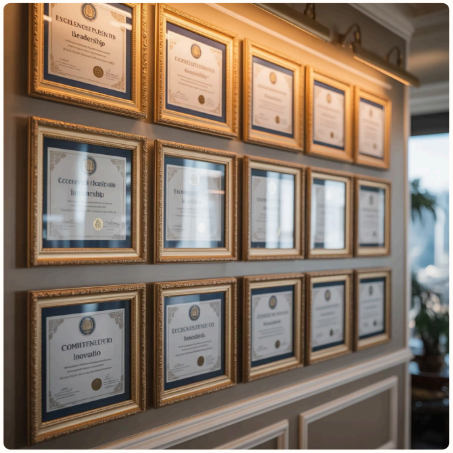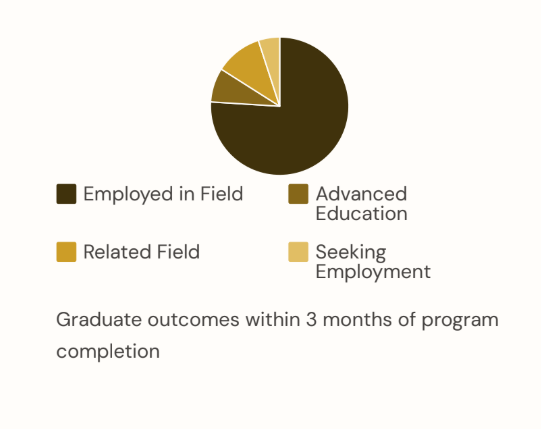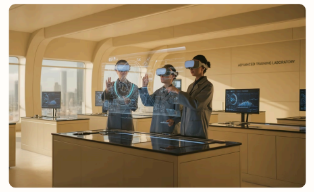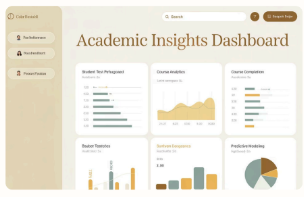Our Training Standards: Commitment to Quality Assurance
At our placement school, quality assurance isn’t just a process4it’s the foundation of everything we do. This document outlines our comprehensive approach to maintaining excellence across all aspects of our training programs. From our accredited curriculum and certified instructors to our continuous improvement cycles and industry partnerships, we’ve established rigorous standards that ensure our graduates are fully prepared for successful careers. The following sections detail how we implement, measure, and continuously enhance our quality assurance practices to deliver exceptional educational outcomes and employment success for our students.
Our Quality Assurance Philosophy
Quality is not an act but a habit that permeates every level of our organization. Our foundational philosophy centers on the belief that exceptional training outcomes can only emerge from a culture where quality consciousness is embedded in every decision, process, and interaction. This philosophy shapes our approach to education and guides how we develop, deliver, and refine our training programs.
We view quality assurance not as a separate function but as an integral part of our organizational DNA. By fostering a culture where every team member4from administrative staff to senior instructors4 understands their role in upholding quality standards, we create an environment where excellence becomes the natural outcome rather than an aspirational goal.
Our commitment extends beyond mere compliance with external standards. We strive to exceed expectations by consistently delivering educational experiences that transform our students’ capabilities and career prospects. This commitment is reflected in our systematic approach to program design, delivery, and evaluation.
This comprehensive approach ensures we maintain a dynamic equilibrium between established best practices and innovative methodologies, creating a learning environment that consistently produces industry-ready professionals who meet and exceed employer expectations.
Quality Culture
We foster an organizational culture where quality consciousness is embedded at every level, from leadership to support staff. Each team member understands their contribution to our excellence standards.
Service Excellence
Our training programs are designed with a service- oriented mindset, focusing on meeting and exceeding the expectations of both students and industry employers.
Continuous Improvement
Using data-driven insights from assessments, student feedback, and industry developments, we implement targeted improvements to enhance program effectiveness.
Self-Assessment
We maintain a rigorous schedule of internal audits and program evaluations to identify areas for improvement before they affect quality outcomes.
Accreditation and External Recognition
Our institution maintains the highest level of credibility through rigorous accreditation processes and external validation. We understand that accreditation serves as a critical quality assurance mechanism that provides independent verification of our educational standards. These external endorsements affirm our commitment to excellence and give our students confidence in the value of their training.
We have secured and maintain accreditation from key national and state regulatory bodies that oversee vocational and professional education. These accreditations require us to meet comprehensive standards related to curriculum design, instructor qualifications, facilities, student support services, and administrative processes. The regular renewal processes for these accreditations ensure that we remain at the forefront of educational best practices.
Beyond mandatory accreditations, we actively pursue recognition from industry-specific certification bodies and professional associations. These specialized endorsements validate the relevance and rigor of our training programs in preparing students for specific career paths and industry requirements.

Our Key Accreditations:
- National Career Education Accreditation Commission
- State Board of Professional Technical Education
- International Association of Quality Training Providers
- Industry-specific certification authorities
Our Audit and Compliance Process
Initial Documentation
Comprehensive preparation of policies, procedures, curriculum materials, and operational evidence for accreditation review.
Self-Assessment
Internal audit against accreditation standards to identify and address any potential compliance gaps before external review.
Standards-Aligned Curriculum
The foundation of our quality assurance framework rests on a meticulously designed curriculum that aligns with both national education standards and industry-specific requirements. This dual alignment ensures our programs deliver training that is both academically sound and practically relevant to workplace demands.
Our curriculum development process follows a structured methodology that begins with comprehensive research into current industry practices, emerging trends, and technological advancements. This research informs the creation of learning objectives that directly correlate to professional competencies demanded in the workplace. Every course module and learning activity is mapped to specific national standards and industry benchmarks, creating a clear pathway from learning outcomes to career success.
To ensure our curriculum remains current and relevant, we conduct formal reviews on a quarterly basis and comprehensive revisions annually. These reviews incorporate feedback from multiple stakeholders, including industry partners, current students, recent graduates, and instructors. Additionally, we benchmark our curriculum against those of leading institutions globally to identify opportunities for enhancement.
Our commitment to standards-aligned curriculum development extends to customization capabilities that allow us to tailor specific aspects of our programs to meet unique regional employment needs or specialized industry requirements while maintaining core quality standards. This balanced approach ensures graduates possess both the universal fundamentals and specialized knowledge required for career success.
Industry Analysis
We conduct thorough research on current and emerging industry requirements, technological trends, and employer expectations to establish foundational content needs.
Standards Mapping
Each curriculum component is meticulously mapped to relevant national education standards, professional certification requirements, and industry competency frameworks.
Continuous Improvement
Using data-driven insights from assessments, student feedback, and industry developments, we implement targeted improvements to enhance program effectiveness.
Content Development
Expert instructional designers and subject matter specialists collaborate to create comprehensive learning materials that incorporate both theoretical knowledge and practical applications.
Industry Validation
Curriculum undergoes rigorous review by industry advisory boards and external subject matter experts to verify relevance, accuracy, and alignment with workplace requirements.
Quality Assurance in Daily Operations
Excellence in training doesn’t happen by accident it’s the result of deliberate, consistent attention to quality in everyday operations. Our approach to operational quality assurance involves embedding systematic checks and standardized procedures into our daily routines, creating a foundation of reliability that supports exceptional learning experiences.
Daily Program Checks and Inspections
We implement a comprehensive system of daily operational checks that ensure our training environment consistently meets our quality standards. These inspections cover everything from the physical learning environment to technical equipment functionality and instructional resource availability.
Each morning begins with facility readiness assessments conducted by designated quality coordinators who verify that classrooms, workshops, and laboratory spaces are properly prepared for the day’s training activities. Equipment checks ensure that all technical tools, machinery, and software systems are functioning correctly and calibrated to industry standards.
Our digital learning management system incorporates automated quality checks that monitor content accessibility, assessment availability, and student progress tracking. These technological safeguards work alongside human oversight to create multiple layers of quality control.
Structured Operational Procedures
We maintain a comprehensive operations manual that documents standardized procedures for every aspect of our training delivery. These detailed protocols ensure consistency across instructors, class sessions, and program cohorts while providing clear guidance for handling both routine activities and exceptional situations.

Key Daily QA Activities
- Morning facility and equipment readiness inspections
- Pre-session instructional material verification
- Real-time class observation sampling
- End-of-day performance metrics review
- Student feedback quick-response system
Experienced and Certified Instructors
The cornerstone of our quality assurance framework is our exceptional faculty. We recognize that even the most perfectly designed curriculum can only be effectively delivered by instructors who possess both comprehensive subject matter expertise and superior teaching abilities. Our rigorous instructor selection, development, and evaluation processes ensure that every class is led by a qualified professional who embodies our commitment to educational excellence.
Instructor Qualifications and Recruitment
We maintain stringent requirements for our teaching faculty that go beyond typical academic credentials. Our instructors must demonstrate a powerful combination of formal education, industry experience, teaching aptitude, and professional certifications. This multifaceted qualification approach ensures our students learn from professionals who understand both theoretical principles and real- world applications.
Qualification Area
Minimum Requirements
Preferred Qualifications
Academic Credentials
Bachelor’s degree in relevant field
Advanced degree (Master’s or PhD)
Industry Experience
5+ years of direct professional experience
10+ years including leadership roles
Teaching Experience
1+ year in educational or training roles
3+ years with demonstrated effectiveness
Professional Certifications
Current industry-standard
certifications
Advanced and multiple
specializations
Instructional Certification
Basic teaching methodology training
Advanced pedagogical
certifications
Industry Currency Program
All instructors participate in our structured Industry Currency Program, which includes annual return-to-industry experiences, professional development, and certification updates to ensure teaching remains aligned with current industry practices.
Pedagogical Enhancement
Our instructors engage in regular pedagogical training to expand their teaching toolkit with emerging instructional methodologies, learner-centered strategies, and technology-enhanced approaches that improve student engagement and outcomes.
Research and Publication
Faculty members are encouraged and supported in conducting applied research, contributing to professional communities, advancing industry knowledge, and sharing insights through publications and conferences.
Rigorous Assessment and Competency Validation
Assessment is the critical mechanism through which we verify that our training programs are achieving their intended outcomes. Our comprehensive assessment strategy goes far beyond traditional testing to incorporate authentic, industry-relevant evaluation methods that accurately measure both theoretical knowledge and practical capabilities.
Competency-Based Evaluation Framework
Every program we offer is built on a foundation of clearly defined competencies that directly align with industry requirements and professional standards. Our assessment approach evaluates student progress against these competencies using a variety of methods that simulate real-world professional challenges.
Rather than relying solely on traditional knowledge-based examinations, we employ performance-based assessments that require students to demonstrate their ability to apply knowledge in practical scenarios. These assessments are designed to mirror the types of tasks and problems graduates will encounter in their professional roles.
Our competency validation process employs a progressive model, beginning with foundational skill verification and advancing to complex integrated assessments that require students to synthesize multiple competencies in comprehensive projects.

Continuous Improvement Cycle
Quality assurance at our institution isn’t a static achievement but an ongoing journey of systematic enhancement. We operate a structured continuous improvement cycle that transforms feedback, performance data, and industry developments into tangible program refinements. This dynamic approach ensures our training remains relevant, effective, and aligned with evolving workplace requirements.
Our continuous improvement methodology follows a systematic process that begins with comprehensive data collection and culminates in measured enhancements to our programs, processes, and practices. This cycle operates at multiple levels simultaneously4from daily operational adjustments to strategic curriculum revisions4creating an environment of constant refinement.
Data Collection
Systematic gathering of performance metrics, stakeholder feedback, and industry intelligence through surveys, interviews, assessments, and external benchmarking.
Analysis
Rigorous examination of collected data to identify patterns, trends, and improvement opportunities, including root cause analysis of any performance gaps.
Planning
Development of specific, measurable improvement initiatives with clear objectives, resource allocations, timelines, and success indicators.
Evaluation
Assessment of implemented changes against established success metrics to verify effectiveness and identify any secondary adjustments needed.
Implementation
Careful execution of improvement plans with ongoing monitoring and adjustment as needed to ensure intended outcomes are achieved.
Feedback Collection Systems
We maintain comprehensive feedback mechanisms that capture insights from all stakeholder groups, including current students, recent graduates, employers, industry partners, and instructors. These mechanisms include structured surveys at multiple program points, facilitated focus groups, individual interviews, and digital feedback platforms that allow for continuous input.
Hands-On Training and Practical Application
The heart of our educational philosophy is our commitment to applied learning through extensive hands-on training. We recognize that professional competence develops not through passive knowledge acquisition but through active skill application in realistic contexts. Our programs are designed around this principle, emphasizing practical experience as the primary vehicle for developing job-ready capabilities.
Every program we offer maintains a carefully calibrated balance between theoretical foundation and practical application, with most courses dedicating 60-70% of instruction time to hands-on activities. This approach ensures students not only understand conceptual frameworks but can confidently apply them in authentic workplace scenarios.
Our practical training methodologies are designed to progressively build capability through a sequence that begins with basic skill development in controlled environments and advances to complex project work that mirrors actual workplace conditions and constraints. This scaffolded approach allows students to develop confidence while gradually facing increasingly realistic challenges.

Learning Environments

Specialized Labs
Purpose-built training environments equipped with industry-standard tools, machinery, and systems that replicate authentic workplace settings. Each program has dedicated lab spaces designed to support hands-on learning and real-world skill application.

Simulation Centers
Advanced digital simulation platforms that allow students to practice complex procedures, troubleshooting, and decision-making in virtual environments before applying skills in real-world settings. Each program has tailored simulation modules that reflect industry-specific scenarios and standards.

Project Studios
Collaborative workspaces where students engage in comprehensive real-world projects for actual clients, experiencing authentic workplace dynamics while building portfolios, refining soft skills, and applying interdisciplinary knowledge in practical settings.
Inclusive and Supportive Learning Environment
Quality education must be accessible to learners from all backgrounds and with diverse learning needs. Our commitment to inclusivity is a fundamental aspect of our quality assurance framework, ensuring that every student receives the support necessary to achieve their full potential regardless of their starting point, learning style, or personal circumstances.
We recognize that adult learners bring varied experiences, strengths, and challenges to their educational journey. Our approach to inclusivity begins with program design that incorporates universal design principles, ensuring that core content is accessible through multiple modalities and can be navigated successfully by students with different learning preferences and needs.
Personalized Learning Pathways
Comprehensive Intake Assessment
Each student undergoes detailed skills and learning profile evaluation to identify strengths, gaps, and optimal learning approaches before beginning their program.
Individualized Learning Plan
Based on assessment results, a customized plan is developed that outlines specific support strategies, supplemental resources, and milestone targets tailored to each student.
Targeted Support Provision
Appropriate resources are activated based on individual needs, including tutoring, accommodations, supplemental instruction, and technological aids.
Progress Monitoring & Adjustment
Continuous tracking of student advancement allows for responsive adaptation of support mechanisms to address emerging needs and capitalize on developing strengths.
Comprehensive Support Services
Beyond instructional accommodations, we provide a robust ecosystem of support services designed to address the holistic needs of our diverse student population. These services are fully integrated with our academic programs and are considered essential components of our quality assurance framework rather than optional add-ons.
Industry Partnerships and Advisory Boards
Quality training that truly prepares graduates for workplace success cannot be developed in isolation from the industries it serves. Our extensive network of industry partnerships and formalized advisory relationships ensures our programs remain directly aligned with current employer needs and emerging workplace trends.
We have cultivated strategic relationships with leading employers across all sectors represented in our program portfolio. These partnerships go far beyond occasional consultation to include structured involvement in curriculum development, skills validation, student assessment, and program evaluation. By embedding industry voice throughout our quality assurance processes, we ensure our training directly addresses actual workplace requirements rather than academic assumptions about professional practice.
Advisory Board Structure and Function
Each program area maintains a dedicated Industry Advisory Board composed of senior practitioners, technical specialists, human resources professionals, and business leaders from relevant sectors. These boards meet quarterly and follow a structured process for reviewing program elements and providing actionable guidance on content, methodologies, equipment, and emerging skill requirements.
Curriculum Validation
Advisory boards conduct annual comprehensive reviews of program content to verify alignment with current industry practices and technologies, recommending specific additions, modifications, or deletions.
Trend Forecasting
Board members provide early intelligence on emerging industry developments, technological shifts, and evolving skill requirements, allowing us to proactively adapt our training focus.
Assessment Standards
Industry partners help establish realistic performance standards for practical assessments and often participate directly in evaluating student projects and demonstrations.
Equipment & Technology
Advisors guide decisions on training facility equipment, software systems, and technical resources to ensure students gain experience with relevant tools and platforms.
Comprehensive Support Services
Beyond instructional accommodations, we provide a robust ecosystem of support services designed to address the holistic needs of our diverse student population. These services are fully integrated with our academic programs and are considered essential components of our quality assurance framework rather than optional add-ons.
Measurable Outcomes and Graduate Success
The ultimate measure of our training quality is the success of our graduates in securing relevant employment and performing effectively in their professional roles. We maintain comprehensive systems for tracking, analyzing, and reporting these outcomes, creating a clear picture of our programs’ real-world impact and value.
Our outcomes assessment framework looks beyond simple placement rates to examine multiple dimensions of graduate success, including employment relevance, career progression, employer satisfaction, and long- term professional development. This multi- faceted approach provides a more nuanced understanding of our programs’ effectiveness in preparing students for sustainable career success.
We collect outcomes data through systematic surveys of graduates at multiple intervals (3, 6, and 12 months post-completion), structured employer feedback mechanisms, and ongoing engagement with our alumni network. This information is analyzed to identify both program strengths and improvement opportunities, with findings directly informing our continuous enhancement processes.

Key Performance Indicators
Percentage of graduates employed in their field or a related area within six months of program completion.
Percentage of students who successfully obtain relevant industry certifications on their first attempt.
Percentage of hiring employers who rate our graduates’ job readiness and performance as exceeding expectations.
Percentage of employed graduates who report career progression within one year of completing their program.
Transparent Reporting and Accountability
Transparency is a cornerstone of our quality assurance approach. We believe that open communication about our performance, challenges, and improvement initiatives builds trust with stakeholders while creating productive accountability that drives excellence. Our commitment to transparency extends to all aspects of our operations, with particular emphasis on outcomes reporting, quality metrics, and response to feedback.
We maintain comprehensive reporting systems that document program performance across multiple dimensions, from student learning outcomes to graduate employment success. These reports are designed to provide clear, accessible information to diverse stakeholder groups while also supporting internal quality management processes.
Annual Quality Assurance Report
Our flagship accountability document is the Annual Quality Assurance Report, which provides a comprehensive overview of institutional performance, quality initiatives, and improvement outcomes. This document integrates data from multiple sources to create a holistic picture of our quality status and trajectory.
Performance Metrics
The report includes detailed data on key performance indicators such as completion rates, certification attainment, employment outcomes, and employer satisfaction. These metrics are presented with contextual information and trend analysis to facilitate meaningful interpretation.
Quality Initiative Outcomes
Each year’s report documents the results of major quality improvement projects undertaken during the reporting period, including objective measurements of their impact and lessons learned through implementation.
Accreditation Status
The report provides transparent information about our standing with all accrediting and regulatory bodies, including any compliance issues identified and our response to addressing them.
Strategic Quality Goals
Looking forward, the report outlines specific quality enhancement targets for the coming year with clear metrics for measuring progress and accountability mechanisms for ensuring follow-through.
This report is made available to all stakeholders through multiple channels, including our website, direct distribution to advisory board members and industry partners, and presentation at annual stakeholder meetings. We actively encourage questions and discussion about the report’s contents, viewing engagement with the data as a valuable part of our improvement process.
Hands-On Training and Practical Application
Excellence in quality assurance isn’t achieved through compliance alone4it requires a deep organizational commitment to pursuing exceptional standards and embracing innovation in both content and delivery. Our approach to quality is guided by a forward-looking vision that balances proven best practices with creative approaches to emerging challenges and opportunities.
At the core of our quality philosophy is the recognition that excellence is a moving target that requires continuous aspiration rather than a fixed destination. We foster an organizational culture that celebrates achievement while maintaining healthy dissatisfaction with the status quo, constantly asking how we can further enhance the training experience and outcomes for our students.
This commitment to excellence manifests in our willingness to exceed minimum standards in every aspect of our operations. From faculty qualifications and facility specifications to assessment rigor and student support services, we consistently aim beyond baseline requirements to deliver truly exceptional educational experiences.

Mission-Driven Quality Focus
Our Mission
To foster self-reliance and technical expertise through transformative education that empowers individuals to achieve professional excellence and contribute to economic advancement.
Our quality assurance practices are directly aligned with this core mission, with each standard and process designed to support the development of self-reliant professionals with market-relevant technical capabilities. This mission alignment ensures that quality isn’t pursued as an abstract goal but as a concrete expression of our fundamental purpose.
We regularly revisit our quality frameworks through the lens of this mission, asking whether our current practices are optimally supporting the transformation and empowerment of our students. This mission-centered approach keeps our quality efforts focused on outcomes that truly matter rather than procedural compliance alone.
Looking Ahead: Sustaining Quality for the Future
As we look to the future, our commitment to quality assurance must evolve to address emerging challenges and opportunities in both education and the industries we serve. Our forward-looking quality strategy focuses on sustainable excellence through continued investment, expanded partnerships, and adaptive standards that remain relevant in a rapidly changing landscape.
Investment in Advanced Training Infrastructure
Maintaining cutting-edge quality in technical training requires continuous investment in physical resources, technological systems, and human capabilities. Our strategic plan includes significant allocations for infrastructure development that will support the next generation of technical training excellence.

Next-Generation Facilities
Development of specialized training environments that incorporate emerging technologies and replicate evolving workplace conditions, including advanced simulation capabilities and integrated digital/physical workspaces.

Enhanced Data Systems
Implementation of comprehensive learning analytics platforms that provide deeper insights into student progression, skill development patterns, and program effectiveness, enabling more precise quality interventions.

Faculty Development
Expanded investment in instructor capabilities through advanced certification programs, industry immersion experiences, and collaborative research opportunities that ensure our teaching staff remains at the cutting edge of both content knowledge and pedagogical expertise.
Global Quality Benchmarking
As industries increasingly operate in global contexts, our quality standards must reflect international best practices and prepare students for worldwide career opportunities. We are expanding our quality benchmarking beyond national frameworks to incorporate global standards and perspectives.
Our future accreditation strategy includes pursuit of international quality certifications that validate our programs against global benchmarks. We are also developing partnerships with leading institutions in other countries to facilitate knowledge exchange and comparative quality assessment that broadens our perspective on excellence.
